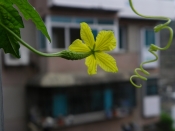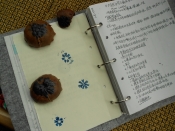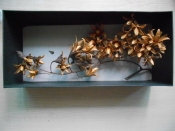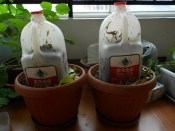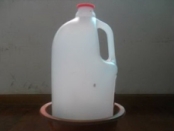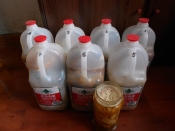By Zhu Xiaoxing / PCD Assistant Programme Officer (Ecovillage Programme, Guizhou)
 The Story Began with a Science Fiction Fan
The Story Began with a Science Fiction Fan
The earliest science fiction story I read was written by Jules Verne. I probably came across it by chance. However, when I read how the survivors in The Mysterious Island overcame their predicament after undergoing all sorts of hardship and turned an uninhabited island into their home, I felt happy as though I had reaped success together with the survivors in the story.
Fanciful Insights from the Fantasies of Science Fiction
In the beginning, I was simply attracted by the strange fantasies and wonderful ideas of science fiction writers. I kept looking for this kind of literature, and kept reading. Later I learnt that this writing genre was called science fiction and the writers were imagining the possible impact of science and technology on human society and human beings. As I read more of these works, I became more influenced by them and shared the writers’ reflections on contemporary civilisation. Even though these stories are often about a world in which science and technology are very advanced, “human beings” in the stories are often not omnipotent. For me this is a wonderful irony. In science fiction, human beings are often constrained by the environment and can only live in a narrowly delimited environment: if on land, outside of their habitat human beings usually cannot move around as they wish without spacesuits, just like in the movie, Avatar, and if in space, they must stay in their starships. I remember being amazed when I read that everything has to be recycled when humans travel and live in spaceships. For example, urine has to be turned into drinking water. I was so absorbed by the stories and yet so ignorant that I tried to reuse waste that I produced myself. First I watered the chilli pepper of my neighbour with my own urine and ended up killing the plant. Then I tried to cultivate plants without soil in vials. In the latter case I actually succeeded. It was heartening to see life growing in such a small vial.
Perhaps life in those days was not so bad that it made one feel that more changes were necessary. My knowledge was therefore not put to further use. At that time there was not so much garbage. It made up a very small part of our life. Plastic bags were so scarce that the few that were left behind by garbage trucks became treasures which were used by us to light fires.
Wang Jian, a colleague, asked me not long ago if I liked the smell of vehicle exhaust gases when I was small. Like him, I grew up breathing fresh clean air, and was therefore particularly sensitive to such smells. Actually I loved them, particularly those from heavy diesel vehicles. I would run behind trucks for a while just to smell them.
However, such days are now gone forever. The speed of the spread of garbage has exceeded that of the desert. Air pollution brings months of smog to the north of China, and the problem of drought in the southwest is becoming worse because of climate change. More and more scenarios that we have never seen before or could never imagine are turning into realities in our everyday life.
Feeling Sad for Being a “Human Being”
I am not sure whether it was an influence of science fiction, but I have been very pessimistic since I was small. I was worried that the end of the world would happen during my life-time and it was all because of what human beings had done. Because of such pessimism, I felt that I hated myself for being a “human being”. The more I witnessed the enormous destructive power of my own kind, the more I wanted to find ways to counter this power.
To free myself from such depressing emotions, I tried to do something. I designed an activity to “observe abstinence from using plastics” and encouraged people to think about how they could stop using plastic bags or try to reuse bags as many times as possible. I also tried to manage water usage in my everyday life in such a way that I could reuse water again and again. In spite of what I did, I still felt that my power was too small, what I could do was far too little, and too few people knew about these issues. Then I took part in the EDE course (Ecovillage Design Education) and learnt about permaculture [1]. Later I started to work in ecological agriculture in a rural community from which I have gained a lot of insights.
What Should be Done?
What we call “garbage” in modern times is material that we do not think we need anymore. But we do need aesthetics in our everyday life. If we could look from an aesthetic point of view at things we don't need, these things might not seem so undesirable. Instead, some have their own charm and others are actually rather beautiful. For example, I noticed that a flower seemed to be engraved on the bottom of mangosteens. When I ate a mangosteen, I deliberately preserved the whole of the hard cover and made it into a stamp. When I visited the local community, I also picked some pods of the Chinese toon and turned them into interior decorations.
Traditional rural communities are the most nature-friendly. Seemingly useless items are turned into useful resources through composting, and this approach can also be applied by city-dwellers. Friends engaged in farming often complain that “there is no soil in cities”. To show them that soil can be found everywhere and to make it easier for my own cultivation activities, I have set down a goal for myself to “turn garbage into compost, and turn compost into soil”. I use throw-away milk cartons, plastic bottles and pots as containers and have found a simple way to do composting at home that satisfies my own needs and also those of my friends. Balcony farming is an activity that readily brings human beings and nature together. I used to grow only decorative plants on my balcony. As food safety becomes more and more of an issue, I have also begun to grow some vegetables myself. Even though I still buy vegetables from the market, I am now less dependent on this source. Last year I grew some bitter gourds, tomatoes and chilli peppers on the soil that I had nurtured myself. However, I was late in planting them and so the harvest was small. As the saying goes, “cultivate gourds and grow beans around Qingming Festival” I started to nourish new life this year around Qingming. There are now pumpkins, loofahs and leafy vegetables on my balcony.
Apart from compost and soil, enzymes have also become the bridge between me and other people. When I first learnt to make enzymes, I actually did not believe in their use. Because of this, the first bucket of enzymes that I made was left unused for one to two years. It was only when I started thinking about how to reduce the volume of garbage that I thought about the use of enzymes again. While I make enzymes myself, I also tell others how to do it. I use enzymes both to wash dishes and to wash myself. My parents use enzymes to bathe their feet and my friends use enzymes as a remedy to expel wind from their bodies (a Chinese medical treatment for rheumatism), to reduce the effects of alcohol and to nourish their energy. When I’m making enzymes, I have also gained other knowledge. I have learnt that one should use as many kinds of raw materials as possible if circumstances permit. The enzymes made this way will turn out better. Even though the fermentation of the enzymes takes only three months, the longer the product is allowed to ferment, the more fragrant it will be. In other words, the making of enzymes has taught me about diversity and persistence.
Goodbye to Pessimism and Confusion!
Looking back on the path that I have taken, I think that it was science fiction that allowed me to continue to learn about myself. However it is the rural village that provides me, a person born in and brought up in the city, with the capacity to address environmental problems and helps me to break out of the feeling of loneliness. The fantasies imagined by science fiction writers rarely become reality, whereas ideas that originated over a thousand years ago still work today. Since I embarked on agriculture I have learnt of agricultural thoughts that have lasted for over 4,000 years and yet still feel fresh and green. Moreover these thoughts are usually environmentally friendly. I always sigh and exclaim that agricultural civilisation is truly rational because it embraces planning and long term vision. A while ago, I heard a friend saying that agriculture is a branch of knowledge that studies “eternity”. I think his comment hits the mark.
Perhaps even now I still don’t know what should be done for the sake of keeping the sky blue in my heart and dreaming more beautiful dreams. Yet I have found the direction and no more pessimism and confusion lingers in my mind.


